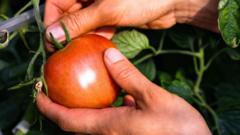A recent analysis has uncovered a troubling connection between several 'Italian' tomato purees sold in UK supermarkets and tomatoes likely derived from forced labor in China, specifically Xinjiang province, prompting scrutiny over supply chain transparency.
Hidden Sourcing: UK Supermarkets’ ‘Italian’ Tomato Purees Linked to Chinese Forced Labor

Hidden Sourcing: UK Supermarkets’ ‘Italian’ Tomato Purees Linked to Chinese Forced Labor
Investigation reveals unsettling truth behind 'Italian' tomato products in UK supermarkets, raising concerns over labor practices.
The findings of an investigation conducted by BBC World Service reveal that various tomato purees marketed as 'Italian' may actually contain tomatoes sourced from China, where alarmingly, their production is linked to forced labor practices involving Uyghur and other Muslim minorities. Despite the branding of products like Tesco’s "Italian Tomato Purée" and Asda’s double concentrate, testing indicated that many of these purees are likely mixed with tomatoes from Xinjiang.
Xinjiang is prominently known for its large-scale tomato cultivation—accounting for approximately a third of global tomato production—set against the backdrop of human rights violations and mass detentions of Uyghur individuals by the Chinese government. Allegations of torture and forced labor within the agricultural sector have raised concerns globally. Many tomatoes intended for export are reportedly transported through a complex route involving several countries before reaching Europe.
Among the significant findings in the investigation, shipping data suggested that Italian tomato-processing company Antonio Petti has received millions of kilograms of tomato paste from suppliers in Xinjiang, linking the firm to the contentious labor practices. The results further demonstrated a troubling pattern: 17 out of 64 tested tomato purees contained trace elements indicative of Chinese origin, specifically tied to major brands and supermarket products throughout Europe.
Responses from the implicated supermarkets varied. While some like Tesco and Rewe pledged to investigate further and suspended certain products, others refuted the claims, stating their own tests denied the presence of Chinese tomatoes. Lidl, however, acknowledged a limited use of Chinese tomatoes in the past but asserted their current avoidance of such.
Despite these revelations, the conversation around ethical sourcing remains fraught. The ease with which tomatoes can be mislabeled and the complexities of global supply chains present significant challenges for regulatory bodies. Advocacy groups are calling for tighter legislation to prevent the entry of products linked to forced labor into European markets.
Amidst scrutiny and demand for a more ethical food system, stakeholders are being urged to consider the implications of low prices and the potential human costs behind them. Investigations like these call for a re-evaluation of food sourcing practices and a push for transparency in the supply chain to prevent complicity in human rights abuses.
Xinjiang is prominently known for its large-scale tomato cultivation—accounting for approximately a third of global tomato production—set against the backdrop of human rights violations and mass detentions of Uyghur individuals by the Chinese government. Allegations of torture and forced labor within the agricultural sector have raised concerns globally. Many tomatoes intended for export are reportedly transported through a complex route involving several countries before reaching Europe.
Among the significant findings in the investigation, shipping data suggested that Italian tomato-processing company Antonio Petti has received millions of kilograms of tomato paste from suppliers in Xinjiang, linking the firm to the contentious labor practices. The results further demonstrated a troubling pattern: 17 out of 64 tested tomato purees contained trace elements indicative of Chinese origin, specifically tied to major brands and supermarket products throughout Europe.
Responses from the implicated supermarkets varied. While some like Tesco and Rewe pledged to investigate further and suspended certain products, others refuted the claims, stating their own tests denied the presence of Chinese tomatoes. Lidl, however, acknowledged a limited use of Chinese tomatoes in the past but asserted their current avoidance of such.
Despite these revelations, the conversation around ethical sourcing remains fraught. The ease with which tomatoes can be mislabeled and the complexities of global supply chains present significant challenges for regulatory bodies. Advocacy groups are calling for tighter legislation to prevent the entry of products linked to forced labor into European markets.
Amidst scrutiny and demand for a more ethical food system, stakeholders are being urged to consider the implications of low prices and the potential human costs behind them. Investigations like these call for a re-evaluation of food sourcing practices and a push for transparency in the supply chain to prevent complicity in human rights abuses.





















